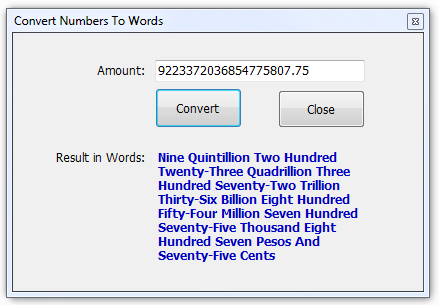Introduction
A lot of programs and code on converting numbers to words can be found everywhere on the internet but I decided to make my own. I came up with my own ideas while I was working with an accounting application which contains a check writer module that needs to convert the entered value to words. And here now, I am sharing with everyone.
This program contains neat code on how to convert numbers to words. To minimize the lines of codes, I used a recursive function.
The logic is simple:
- Segregate the whole numbers in sets with 3-digit numbers each.
- Determine the ones, tens and hundreds of each digit in the sets and put the corresponding word for each.
- Determine what set should be the thousand, million, billion, until quintillion, then put the corresponding word.
- If decimal numbers exist, determine also the tenths and hundredths and put the corresponding word. (If greater than tenths, say thousandths (3-digit value) or millionths (4-digit value), the decimal value is rounded off to hundredths only, that's 2-digit decimal value.)
- Combine the evaluated statements and display the result.
The Source Code
This is the complete code of the function:
Public Function AmountInWords(ByVal nAmount As String, Optional ByVal wAmount _
As String = vbNullString, Optional ByVal nSet As Object = Nothing) As String
If Not IsNumeric(nAmount) Then Return "Please enter numeric values only."
Dim tempDecValue As String = String.Empty : If InStr(nAmount, ".") Then _
tempDecValue = nAmount.Substring(nAmount.IndexOf("."))
nAmount = Replace(nAmount, tempDecValue, String.Empty)
Try
Dim intAmount As Long = nAmount
If intAmount > 0 Then
nSet = IIf((intAmount.ToString.Trim.Length / 3) _
> (CLng(intAmount.ToString.Trim.Length / 3)), _
CLng(intAmount.ToString.Trim.Length / 3) + 1, _
CLng(intAmount.ToString.Trim.Length / 3))
Dim eAmount As Long = Microsoft.VisualBasic.Left(intAmount.ToString.Trim, _
(intAmount.ToString.Trim.Length - ((nSet - 1) * 3)))
Dim multiplier As Long = 10 ^ (((nSet - 1) * 3))
Dim Ones() As String = _
{"", "One", "Two", "Three", _
"Four", "Five", _
"Six", "Seven", "Eight", "Nine"}
Dim Teens() As String = {"", _
"Eleven", "Twelve", "Thirteen", _
"Fourteen", "Fifteen", _
"Sixteen", "Seventeen", "Eighteen", "Nineteen"}
Dim Tens() As String = {"", "Ten", _
"Twenty", "Thirty", _
"Forty", "Fifty", "Sixty", _
"Seventy", "Eighty", "Ninety"}
Dim HMBT() As String = {"", "", _
"Thousand", "Million", _
"Billion", "Trillion", _
"Quadrillion", "Quintillion"}
intAmount = eAmount
Dim nHundred As Integer = intAmount \ 100 : intAmount = intAmount Mod 100
Dim nTen As Integer = intAmount \ 10 : intAmount = intAmount Mod 10
Dim nOne As Integer = intAmount \ 1
If nHundred > 0 Then wAmount = wAmount & _
Ones(nHundred) & " Hundred "
If nTen > 0 Then
If nTen = 1 And nOne > 0 Then
wAmount = wAmount & Teens(nOne) & " "
Else
wAmount = wAmount & Tens(nTen) & IIf(nOne > 0, "-", " ")
If nOne > 0 Then wAmount = wAmount & Ones(nOne) & " "
End If
Else
If nOne > 0 Then wAmount = wAmount & Ones(nOne) & " "
End If
wAmount = wAmount & HMBT(nSet) & " "
wAmount = AmountInWords(CStr(CLng(nAmount) - _
(eAmount * multiplier)).Trim & tempDecValue, wAmount, nSet - 1)
Else
If Val(nAmount) = 0 Then nAmount = nAmount & _
tempDecValue : tempDecValue = String.Empty
If (Math.Round(Val(nAmount), 2) * 100) > 0 Then wAmount = _
Trim(AmountInWords(CStr(Math.Round(Val(nAmount), 2) * 100), _
wAmount.Trim & " Pesos And ", 1)) & " Cents"
End If
Catch ex As Exception
MessageBox.Show("Error Encountered: " & ex.Message, _
"Convert Numbers To Words", _
MessageBoxButtons.OK, MessageBoxIcon.Error)
Return "!#ERROR_ENCOUNTERED"
End Try
If IsNothing(wAmount) = True Then wAmount = String.Empty Else wAmount = _
IIf(InStr(wAmount.Trim.ToLower, "pesos"), _
wAmount.Trim, wAmount.Trim & " Pesos")
Return wAmount
End Function
The zipped source code has detailed comments and remarks for easy understanding.
Using the Code
The function is easy to use. Just put the function inside your form's code behind or in a module of your project and call it like this:
lblResult.Text = AmountInWords(txtAmount.Text.Trim)
Important: The parameter values you pass into the function should always be in trimmed string format. (See Points of Interest subsection of this article for explanation.)
The value you entered will automatically be converted to words. To show you the result, here is the screenshot of the program:

Note: This version of conversion of numbers to words can convert the maximum value of the LONG datatype which is "9223372036854775807" (that's more than 9 quintillion) plus any 2-digit decimal value. If a 3-digit number is entered, the numbers are automatically rounded off to 2 digits.
Points of Interest
Before I successfully completed the function, I had run into a little bit of problem. That problem is: when I used a number datatype, say DOUBLE, SINGLE, or DECIMAL, or apply type-casting keywords to the entered value like CDBL, VAL, CSNG, and others, and entered values that is more than the range of these datatypes, the program encounters an error and it does not show the correct result. For example:
Let's say I entered the value 42326432465566423. The following error occurred:

Another one that I encountered is this value: 282352345233221.66.

Can you see it? The decimal value is automatically rounded off to a whole number.
Well, the trick/solution that I found to this is to treat the entered value as string. Do not convert or cast the value as number though it's actually a number itself. Retain it as string. When you do, you get the exact result that you want.
That's all for this tip. I hope it helps!
